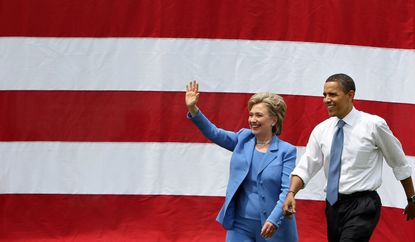Hillary Clinton needs to address the racist undertones of her 2008 campaign
Clinton wasn't exactly a champion of racial justice in her primary battle against Barack Obama


Black Lives Matter, the advocacy group for black interests, has gotten the attention of the Democratic presidential candidates, who are reportedly scrambling to reach out to the movement. Even heavy favorite Hillary Clinton is getting in on it, addressing the movement in a Q&A session on Facebook, where she checked most of the right boxes.
DeRay McKesson, one of the movement's leaders, wrote on Twitter that the post was "solid." But he also noted that she had two days to work on it, and did not attend the liberal forum Netroots Nation, unlike her challengers Bernie Sanders and Martin O'Malley, who flailed in front of activists from Black Lives Matter.
McKesson is right to be suspicious. Hillary Clinton's record on race is not great. If she wishes to earn some trust on issues of racial justice, a good place to start would be with the distinctly racist undertones of her 2008 campaign against Barack Obama.
Subscribe to The Week
Escape your echo chamber. Get the facts behind the news, plus analysis from multiple perspectives.

Sign up for The Week's Free Newsletters
From our morning news briefing to a weekly Good News Newsletter, get the best of The Week delivered directly to your inbox.
From our morning news briefing to a weekly Good News Newsletter, get the best of The Week delivered directly to your inbox.
As the first primaries got underway in 2008, and Obama began to slowly pull ahead, the Clinton camp resorted to increasingly blatant race- and Muslim-baiting. It started in February, when Louis Farrakhan, the head of the Nation of Islam, endorsed Obama in a sermon. In a debate a couple days later, moderator Tim Russert repeatedly pressed Obama on the issue, who responded with repeated reassurances that he did not ask for the endorsement, did not accept it, and in fact was not a deranged anti-Semite. That wasn't enough for Clinton, who demanded that Obama "denounce" Farrakhan, which he did.
About the same time, a picture of Obama in traditional Somali garb (from an official trip) then appeared on the Drudge Report, and Matt Drudge claimed he got it from the Clinton campaign. After stonewalling on the origin question, the campaign later claimed it had nothing to do with it. A Clinton flack then went on MSNBC and argued that Obama should not be ashamed to appear in "his native clothing, in the clothing of his country."
Later, a media firestorm blew up when it was discovered that Obama's Chicago pastor Jeremiah Wright once delivered a sermon containing the words "God damn America." In response, Obama gave a deft, nuanced speech on racial issues, but Clinton kept the issue alive by insisting she would have long ago denounced the man.
The late Michael Hastings, who covered Clinton's campaign, described one instance of this strategy on the ground:
[Clinton supporter] Buffenbarger launched into a rant in which he compared Obama to Muhammad Ali, the best-known black American convert to Islam after Malcolm X. "But brothers and sisters," he said, "I've seen Ali in action. He could rope-a-dope with Foreman inside the ring. He could go toe-to-toe with Liston inside the ring. He could get his jaw broken by Norton and keep fighting inside the ring. But Barack Obama is no Muhammad Ali." The cunning racism of the attack actually made my heart start to beat fast and my ears start to ring. For the first time on the campaign trail, I felt completely outraged. I kept thinking, "Am I misreading this?" But there was no way, if you were in that room, to think it was anything other than what it was. [GQ]
Then there was Bill Clinton comparing Obama's campaign to that of Jesse Jackson's unsuccessful run in 1988. The capstone came in May, when Hillary Clinton started openly boasting about her superior support from white voters.
The effort was not so blatant as George H.W. Bush's Willie Horton ad, but the attempt to play on racist attitudes through constant repetition and association was unmistakable — in addition to playing into right-wing conspiracy theories that Obama is a secret Muslim who was born in Africa. It's likely why in West Virginia — a state so racist that some guy in a Texas prison got 40 percent of the Democratic primary vote in 2012 — Clinton won a smashing victory.
This brings us back to today's presidential race. Many of the demands posed by activists focus on rhetorical gestures of support and solidarity (a notable feature of the Netroots confrontation last weekend). But this raises this issue of trust: A very charming, cynical person could simply promise support using the right words, win the election, then forget all about it.
Does the Hillary Clinton of 2008 sound like someone who's genuinely committed to the cause of racial justice? If she has changed her views, now would be a good time to explain.
Sign up for Today's Best Articles in your inbox
A free daily email with the biggest news stories of the day – and the best features from TheWeek.com
Ryan Cooper is a national correspondent at TheWeek.com. His work has appeared in the Washington Monthly, The New Republic, and the Washington Post.
-
 When will mortgage rates finally start coming down?
When will mortgage rates finally start coming down?The Explainer Much to potential homebuyers' chagrin, mortgage rates are still elevated
By Becca Stanek, The Week US Published
-
 Women are getting their own baseball league again
Women are getting their own baseball league againIn the Spotlight The league is on track to debut in 2026
By Justin Klawans, The Week US Published
-
 Giant TVs are becoming the next big retail commodity
Giant TVs are becoming the next big retail commodityUnder the Radar Some manufacturers are introducing TVs over 8 feet long
By Justin Klawans, The Week US Published
-
 US election: who the billionaires are backing
US election: who the billionaires are backingThe Explainer More have endorsed Kamala Harris than Donald Trump, but among the 'ultra-rich' the split is more even
By Harriet Marsden, The Week UK Published
-
 US election: where things stand with one week to go
US election: where things stand with one week to goThe Explainer Harris' lead in the polls has been narrowing in Trump's favour, but her campaign remains 'cautiously optimistic'
By Harriet Marsden, The Week UK Published
-
 Is Trump okay?
Is Trump okay?Today's Big Question Former president's mental fitness and alleged cognitive decline firmly back in the spotlight after 'bizarre' town hall event
By Harriet Marsden, The Week UK Published
-
 The life and times of Kamala Harris
The life and times of Kamala HarrisThe Explainer The vice-president is narrowly leading the race to become the next US president. How did she get to where she is now?
By The Week UK Published
-
 Will 'weirdly civil' VP debate move dial in US election?
Will 'weirdly civil' VP debate move dial in US election?Today's Big Question 'Diametrically opposed' candidates showed 'a lot of commonality' on some issues, but offered competing visions for America's future and democracy
By Harriet Marsden, The Week UK Published
-
 1 of 6 'Trump Train' drivers liable in Biden bus blockade
1 of 6 'Trump Train' drivers liable in Biden bus blockadeSpeed Read Only one of the accused was found liable in the case concerning the deliberate slowing of a 2020 Biden campaign bus
By Peter Weber, The Week US Published
-
 How could J.D. Vance impact the special relationship?
How could J.D. Vance impact the special relationship?Today's Big Question Trump's hawkish pick for VP said UK is the first 'truly Islamist country' with a nuclear weapon
By Harriet Marsden, The Week UK Published
-
 Biden, Trump urge calm after assassination attempt
Biden, Trump urge calm after assassination attemptSpeed Reads A 20-year-old gunman grazed Trump's ear and fatally shot a rally attendee on Saturday
By Peter Weber, The Week US Published